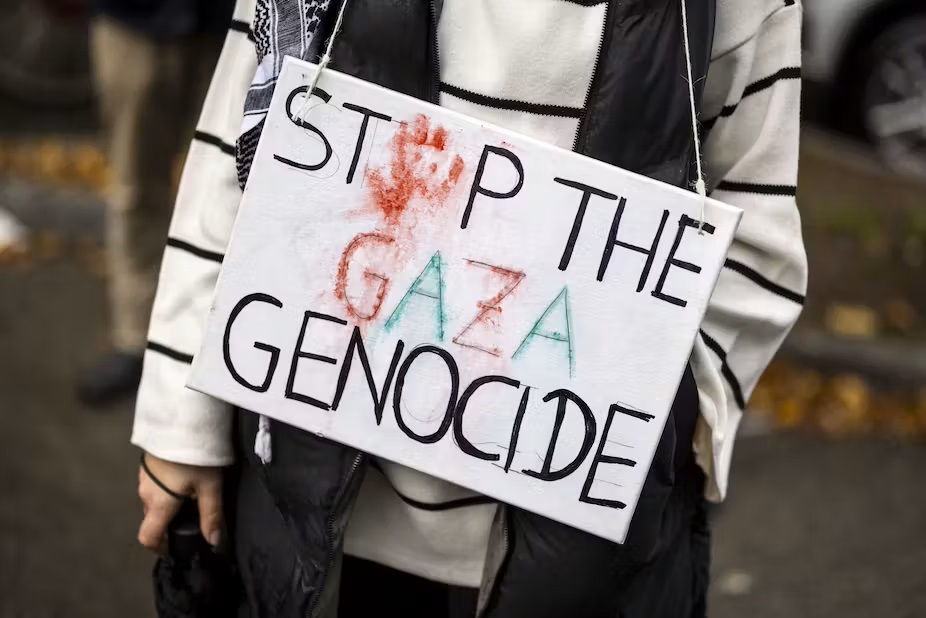Accusations Of Genocide In Israel-Hamas War
Nov 8, 2023 | Pratirodh Bureau
People holding signs calling for an end to genocide in the Gaza Strip have been a common occurrence at pro-Palestinian protests (Christoph Reichwein/picture alliance via Getty Images)
Is genocide taking place in the Middle East?
On both sides of the conflict in Israel and the Gaza Strip, many answer with an unequivocal “yes.”
Some Israelis and other Israel supporters are pointing a finger at Hamas, which killed 1,400 people, most of them civilians – while wounding many more – in Israel and took over 240 hostages in its surprise attack on Oct. 7, 2023.
The attack, some Israel supporters and political observers note, must be seen in the light of Hamas leaders’ repeatedly stated goal of destroying Israel and their recent promise to attack Israel “again and again” until it is gone.
But some Palestinian supporters also say that Israel’s mass displacement of civilians and its bombing campaign in Gaza – which has included the targeting of hospitals, refugee camps and ambulances, where Israel says Hamas personnel are hiding – is clear evidence of genocide.
As of Nov. 6, Israel’s attacks have resulted in more than 10,000 deaths, including thousands of children, according to the Hamas-run Ministry of Health. Pro-Palestinian supporters see this as part of a longer history of Israel’s treatment of Palestinians. Hashtags like #StopTheGenocide and #GenocideinGaza are circulating widely on social media.
U.S. Rep. Rashida Tlaib amplified these allegations when she said on Nov. 4 that President Joe Biden is guilty of supporting genocide in Gaza.
Regardless of people’s position, almost everyone would agree that the crisis is dire, war crimes have likely taken place, far too many civilians have suffered greatly or lost their lives – and the situation has arrived at, or is on the cusp of, genocide.
I am a scholar of genocide studies. As the Israel-Hamas conflict grinds on amid continuing genocide allegations, it’s crucial to understand what genocide actually is and how this term has been used for political purposes in the past.
What Is Genocide?

Raphael Lemkin, a lawyer who was Polish and Jewish, first devised the term “genocide” in his 1944 book, “Axis Rule in Occupied Europe.”
Lemkin defined genocide as “the destruction of a nation or of an ethnic group.” Such destruction, he wrote, involves a “coordinated plan of different actions aiming at the destruction of essential foundations of the life of national groups.”
For Lemkin, committing genocide involves not just physical killings, but an assault on the spirit of a group of people – including their social, economic and political ways of life. His definition also encompasses cultural genocide.
In 1948, following the Nazis’ atrocities during the Holocaust, Lemkin lobbied the newly established United Nations to pass a legal agreement, known as a convention, on preventing and punishing genocide.
The 1948 U.N. Genocide Convention specifies that genocide can happen by killing and destroying a group, preventing births and transferring children to another group, among other means.
At the time, some countries used the convention as a political tool to obscure their own histories of genocide. One example: The Soviet Union and others insisted that the definition exclude political groups. The USSR feared it could otherwise be charged for killing political enemies.
The U.S. also had concerns about being accused of committing genocide against Black people, a point I detail in my 2021 book, “It Can Happen Here: White Power and the Rising Threat of Genocide in the US.”
The U.S. successfully lobbied for the U.N. definition to emphasize intent and physical killing. This made it less likely the U.S. would be charged with genocide for Jim Crow policies that enforced segregation of Black Americans.
Using Genocide For Political Reasons
Governments and political leaders have long used genocide claims to make threats against other countries or to provide a rationale for foreign intervention, ostensibly to ward off a genocide.
There is also a long history of government officials arguing about the definition of genocide to deny that it was actually happening.
One of the most notorious examples was the U.S. denial that the mass violence in Rwanda in 1994 was genocide, because it did not match the “precise legal meaning” of the term.
The U.S. feared that if it called the violence “genocide,” then it would be compelled to intervene in Rwanda. Armed militias representing an ethnic group of people called Hutus, who were in control of the government, killed an estimated 800,000 Tutsi people – an ethnic minority – during this genocide.
Today, countries like Russia and China continue to deny that they are committing what many experts consider genocide.
Three Ways Genocide Is Discussed
In my research, I have found that people often approach genocide in three ways.
First, legal scholars contend that before violence is considered genocide, it is necessary to demonstrate that what occurred neatly matches what the Genocide Convention spells out.
Others, including many scholars in the social sciences and humanities, have a broader view of what genocide means and maintain it could apply to a range of cases and dynamics, including settler colonialism and enslavement.
Many follow Lemkin in emphasizing that genocide can be carried out not just by killing, but through a multi-pronged attack on a group’s political, social, cultural, economic, religious, moral and economic way of life.
Finally, and most frequently, some people have a more conventional view that lacks a clear definition, but which generally associates genocide with any attempt to destroy a group of people.
This could mean not just mass death and destruction, but also things like abortion.
Genocide And The Israel-Hamas War
People are using these three different interpretations of genocide to characterize the Israel-Hamas war.
Many appear to want a way to understand and label the images of horrific violence that fill their screens.
Genocide, for all its conceptual limitations, provides a way of understanding the violence in Israel and Gaza. And so, people invoke the word genocide in its conventional sense, sometimes through genocide-related hashtags and slogans.
But long before the current crisis, scholars were debating whether Israel had committed genocide in Palestinian territories.
Along these lines, a high-ranking U.N. human rights official and lawyer named Craig Mokhiber resigned from his post on Oct. 28, 2023, because he said that, as in the past, the U.N. and Western countries were not preventing Israel’s genocide of Palestinians.
In response, Anne Bayefsky, the head of a New York-based human rights center, accused Mokhiber of “UN antisemitism” and wanting to wipe “ISRAEL OFF THE MAP!” Her remarks echo those of others who say that it is Israelis who are at risk of genocide.
This genocide debate is not going away. Amid mass death and suffering and skyrocketing rates of antisemitism and Islamophobia, however, I think it is critical not to get lost in a war of words and neglect the desperate need to find a path to short- and long-term peace.
(Published under Creative Commons from The Conversation. Read the original article here)
